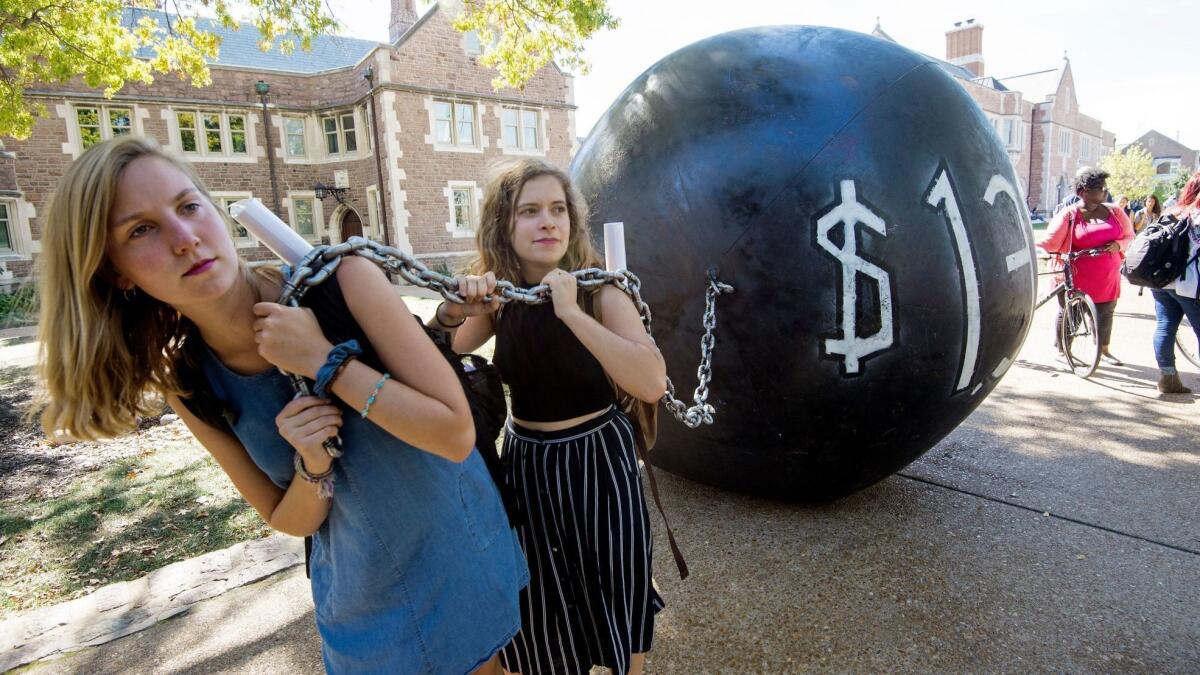A retirement perk for millennials who are buried under student debt

Rariety Monford is being aggressive about her $60,000 in student debt. An engineer at Abbott Laboratories, she puts 14% of her salary toward loan payments each month, far more than the required minimum.
“It is my No. 1 priority,” said Monford, 26, who graduated from North Carolina A&T State University in December 2016. She plans to go to graduate school, even if it means more debt — and short-changing her retirement account — to pay for it.
A new benefit program at Abbott means she won’t have to choose between paying down student debt and saving for the future. For any U.S.-based employee who puts at least 2% of their salary toward student loan payments, the healthcare company will contribute the equivalent of 5% of their salary into their 401(k) plan.
This is Abbott’s twist on a benefit that’s becoming more popular as employers compete for highly educated — and often deeply indebted — workers. About 4% of companies put some money toward employees’ student loans, according to a survey by the Society for Human Resources Management.
Companies have been offering between $500 and a few thousand dollars a year toward student loan payments. That money is treated as taxable income, a drawback for all parties that may explain why more employers aren’t adding the benefit. Bills introduced to change the tax status of the benefit haven’t gained traction.
Abbott’s twist works around the tax penalty, because 401(k) payments are tax-free. Steve Fussell, a human resources vice president at Abbott, says the benefit also helps employees kick off their retirement savings early, which can make a huge difference over several decades of work. Only about a third of millennials are currently contributing to the company’s retirement plan, compared with 90% of the workforce overall.
Abbott hires 1,000 people under age 35 each year. Many of them have master’s degrees or doctorates and therefore have higher debt than typical. Younger employees with student debt contribute less to their 401(k)s than those without.
The company estimates 2,500 to 3,000 of its current 29,000 U.S. employees will use the benefit, which has no time or contribution limits. Employees who join the company with starting annual pay of $70,000 and take advantage of the program could see $54,000 accumulate in their 401(k) accounts over a 10-year period, without any contributions of their own, the company said. That’s assuming a 6% average annual return and yearly merit pay increases of 3%.
“We’ve seen increasingly the pressing levels of student debt and the impact it has on our new grads,” Fussell said. The new benefit will solve a financial savings problem and, he hopes, help retain employees.
American Student Assistance, a nonprofit organization, surveyed 500 workers and found that student loan help ranked third in most important benefits, after health insurance and a 401(k) plan and before other perks such as professional membership payments and commuter benefits.
Nearly 90% of respondents said they would stay with an employer for five years if it helped pay off student loans. In another survey, 65% of the 827 borrowers polled by student loan marketplace LendEDU said they consider student loan repayment assistance when looking for jobs.
As for Monford, she’s excited to be “hitting two birds with one stone.”
“I thought I was only going to be able to pay off my loans and be a decade behind everyone else that is able to invest,” she said. “I would like to get on to better things in life than paying off debt.”
Greenfield writes for Bloomberg. The Chicago Tribune was used in compiling this report.






